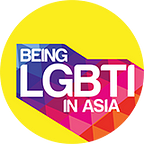Influencing a More Inclusive Response to AIDS in China
11 November 2015
On 11th November in Beijing, the United Nations Development Programme (UNDP) and UNAIDS co-supported the Red Ribbon Forum on the HIV epidemic among men who have sex with men (MSM) in China. The meeting was designed to hear voices and concerns and identify some practical solutions to improve the national response to AIDS in China, with the goal to influence the new 5 year plan on AIDS currently under development.
The forum was hosted by the Chinese Association of HIV and STIs with support from China’s CDC and brought together a group of experts including the National Health and Family Planning Commission and NCAIDS, and a number of key civil society representatives who offered their expertise and some initial policy recommendations on which to base the discussion. In an attempt to share international best practices from countries with similar HIV epidemics to China, Dr. Stephen Wignall from Indonesia and Mr. Murugesan Sivasubramanian from the Humsafar Trust in India made presentations on community-based service delivery programmes.
HIV first emerged in populations of gay men and men who have sex with men in Europe and America in the early 1980s. More than 30 years later, while incredible progress has been made in the response to HIV globally, epidemics of HIV among MSM are on the rise again, almost everywhere. Globally, today men who have sex with men are 19 times more likely to be living with HIV than the general population.
In China over the last 7 years there has been a significant increase in HIV prevalence in MSM. As a percentage of new cases identified each year, homosexual transmission has increased from 2.5% in 2006 to almost 26% last year. In 2014, HIV prevalence in MSM was 7.3%, almost 40 times higher than the rate among the general population. This inequality must be confronted and new strategies found to improve access to testing and treatment services.
It is clear that biomedical interventions alone will not be enough. More needs to be done to reduce stigma and discrimination and to create an enabling environment for the MSM community to play an active part in the response.
In UNDP Deputy Country Director Patrick Haverman’s opening remarks, he praised China’s commitment to end AIDS by 2030 but highlighted “that in order to achieve this goal we cannot leave anyone behind. In order to end AIDS, in China like everywhere else, we need to focus on the most vulnerable and excluded, including MSM and other sexual minorities.”
In light of the recently adopted Sustainable Development Goals (SDGs), and the new UNAIDS target of “90–90–90”, Mr. Haverman concluded that the clear message that countries are facing is a choice between scaling up their AIDS responses or miss the chance to end AIDS. MSM represent a considerable and rising pocket of new infections in China and investing in programmes that protect them, means investing in the end of AIDS.
Within the UNAIDS division of labour, UNDP is the lead agency working on sexual and gender minorities, including men who have sex with men. UNDP hopes that forums such as these will help contribute to reducing inequalities among MSM and other sexual minorities and assist in making sure that the eradication of AIDS remains a top priority.
Originally published at www.cn.undp.org on November 11, 2015.
